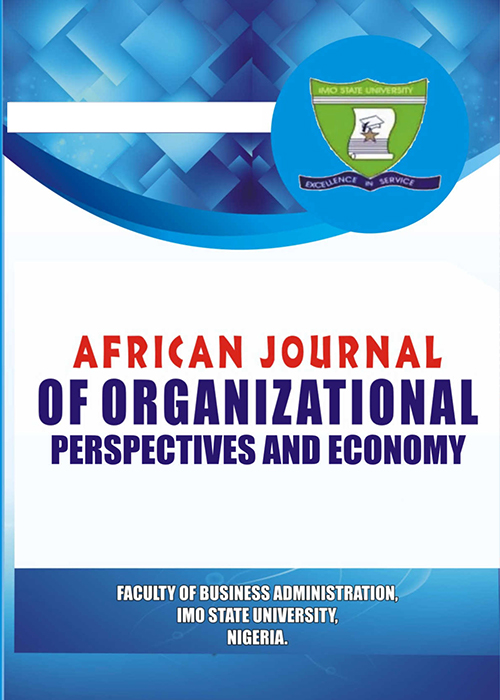DEBT MANAGEMENT AND ECONOMIC PERFORMANCE IN NIGERIA
Abstract
This study examines the relationship between debt management and economic performance in Nigeria from 1986 to 2023, with economic performance proxied by the Economic Performance Index (EPI). This study employed secondary time-series data obtained from the Central Bank of Nigeria Statistical Bulletin and the World Bank Report. Expo facto research design was applied and annual financial data was collected from Nigerian National Bureau of Statistics and Central Bank, while economic data was collected from World Bank for the period 1986-2023. The study utilized a Autoregressive Distributed Lag Model (ARDL) to study the impact using E-views 10. The findings reveal no significant relationship between foreign debt growth rate and the EPI, highlighting the inefficiency of external borrowing in driving economic outcomes. Similarly, domestic debt growth rate showed an insignificant impact on the EPI, suggesting the crowding-out effect of public borrowing on private investment and resource misallocation. Domestic debt servicing growth rate also demonstrated no significant relationship with the EPI, underscoring inefficiencies in debt repayment mechanisms. Conversely, foreign debt servicing growth rate exhibited a significant positive effect on the EPI, signifying that consistent repayment of external debt enhances economic credibility and facilitates access to international financial resources. However, foreign debt servicing growth rate showed no significant effect on unemployment rate, indicating limited linkages between debt-financed activities and employment generation. The study concludes that while effective debt servicing, particularly for external loans, can bolster economic performance, the broader economic impact of debt in Nigeria requires strategic management, resource optimization, and alignment with development priorities. Recommendations include improving debt utilization efficiency, fostering economic diversification, and enhancing transparency in public debt management.
This article is available as a PDF download

Published in AFRICAN JOURNAL OF ORGANIZATIONAL PERSPECTIVES AND ECONOMY
ISSN: 988-47877
This article appears in our peer-reviewed academic journal
View JournalRelated Articles
Explore similar research in our collection
INFLUENCE OF SERVICE CONVENIENCE ON CONSUMER BEHAVIOUR IN OSUN MALL OSOGBO, OSUN STATE, NIGERIA
JUNAID, NAFISAT AJOKE, OMOYELE, OLUFEMI SAMUEL PhD, LAWAL, NURENI ADEKUNLE PhD, AKINTAYO, AKINTUNDE AREMU PhD, OYEKAN, MARVELLOUS ADETOLA
Nov 12, 2025
Service convenience is a good instrument that can be used to improve consumer behaviour in all compa...
View ArticleENTREPRENEURSHIP FOR NATIONAL DEVELOPMENT IN NIGERIA'S CASHLESS ECONOMY
IME E. ESARA, UTITOFON MORGAN
Jun 26, 2025
This paper examines how entrepreneurial activities can contribute to national development in Nigeria...
View ArticleANALYSIS OF THE PERCEIVED OPERATIONAL AND ENVIRONMENTAL SUSTAINABILITY COMPONENTS OF THE LEKKI DEEP SEAPORT
OGUNDIPE OLUWASEUN DAVID
Jun 26, 2025
The relevance of an efficient port system is a critical determinant of a country’s achievement of ...
View Article